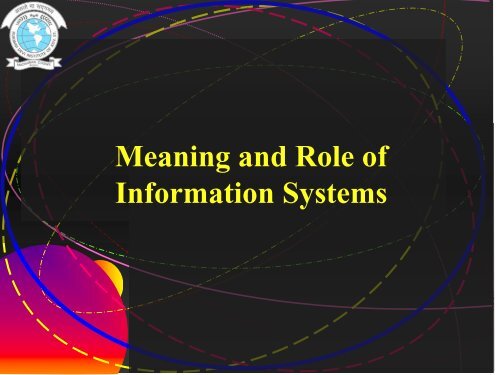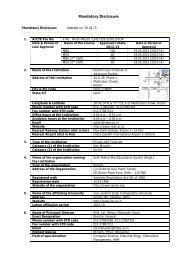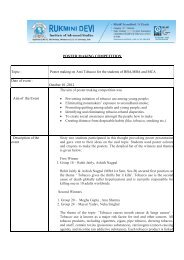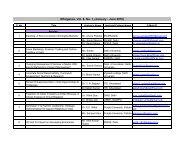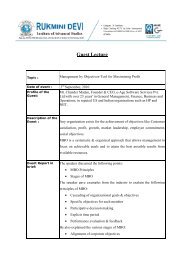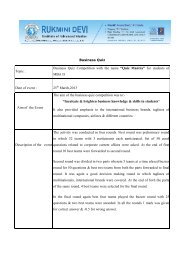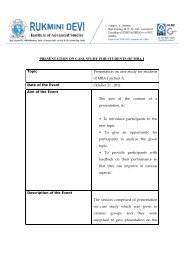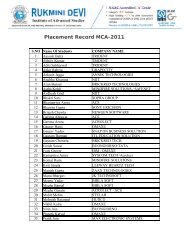Meaning and Role of Information Systems
Meaning and Role of Information Systems
Meaning and Role of Information Systems
- No tags were found...
Create successful ePaper yourself
Turn your PDF publications into a flip-book with our unique Google optimized e-Paper software.
<strong>Meaning</strong> <strong>and</strong> <strong>Role</strong> <strong>of</strong><br />
<strong>Information</strong> <strong>Systems</strong>
<strong>Information</strong> <strong>Systems</strong><br />
• <strong>Information</strong> System (IS). Collects, processes,<br />
stores, analyzes <strong>and</strong> disseminates information<br />
for a specific purpose.<br />
• Computer‐based <strong>Information</strong> System (CBIS).<br />
An information system that uses computer<br />
technology to perform some or all <strong>of</strong> its<br />
intended tasks.<br />
Copyright 2007 Wiley & Sons,<br />
Inc.<br />
Chapter 1 2
<strong>Information</strong> <strong>Systems</strong><br />
Framework
• An IS Framework for Business Pr<strong>of</strong>essionals – The IS knowledge that a<br />
business manager or pr<strong>of</strong>essional needs to know is illustrated in the<br />
Figure. This include<br />
(1) foundation concepts: fundamental behavior, technical, business, <strong>and</strong><br />
managerial concepts like system components <strong>and</strong> functions, or<br />
competitive strategies;<br />
(2) information technologies: concepts, developments, or management<br />
issues regarding hardware, s<strong>of</strong>tware, data management, networks, <strong>and</strong><br />
other technologies;<br />
(3) business applications: major uses <strong>of</strong> IT for business processes, operations,<br />
decision making, <strong>and</strong> strategic/competitive advantage;<br />
(4) development processes: how end users <strong>and</strong> IS specialists develop <strong>and</strong><br />
implement business/IT solutions to problems <strong>and</strong> opportunities arising in<br />
business; <strong>and</strong><br />
(5) management challenges: how to effectively <strong>and</strong> ethically manage the IS<br />
function <strong>and</strong> IT resources to achieve top performance <strong>and</strong> business value<br />
in support <strong>of</strong> the business strategies <strong>of</strong> the enterprise.
Components <strong>of</strong> an INFORMATION<br />
System
• An information system (IS) can be any organized combination <strong>of</strong> people,<br />
hardware, s<strong>of</strong>tware, communications networks, <strong>and</strong> data resources that collect,<br />
transforms, <strong>and</strong> disseminate information in an organization.<br />
•<br />
• <strong>Information</strong> Technologies:<br />
• Business pr<strong>of</strong>essionals rely on many types <strong>of</strong> information systems that use a<br />
variety <strong>of</strong> information technologies. For example:<br />
•<br />
• Types <strong>of</strong> IS ‐ Manual (paper‐<strong>and</strong>‐pencil) information systems<br />
• ‐ Informal (word‐<strong>of</strong>‐mouth) information<br />
systems<br />
• ‐ Formal (written procedures) information<br />
systems<br />
• ‐ Computer‐based information systems<br />
•<br />
• Computer‐based information systems (IS) use hardware, s<strong>of</strong>tware, the Internet,<br />
<strong>and</strong> other telecommunications networks, computer‐based data resource<br />
management techniques, <strong>and</strong> other forms <strong>of</strong> information technologies (IT) to<br />
transform data resources into a variety <strong>of</strong> information products for consumers <strong>and</strong><br />
business pr<strong>of</strong>essionals.
Major <strong>Role</strong>s <strong>of</strong> IS<br />
Support<br />
Competitive<br />
Advantage<br />
Support<br />
Business<br />
Decision Making<br />
Support <strong>of</strong><br />
Business Processes <strong>and</strong> Operations
• Three major roles <strong>of</strong> the business applications <strong>of</strong><br />
information systems include:<br />
• Support Business Processes –involves dealing with<br />
information systems that support the business<br />
processes <strong>and</strong> operations in a business.<br />
• Support Decision Making – help decision makers to<br />
make better decisions <strong>and</strong> attempt to gain a<br />
competitive advantage.<br />
• Support Competitive Advantage – help decision<br />
makers to gain a strategic advantage over<br />
competitors requires innovative use <strong>of</strong> information<br />
technology.


